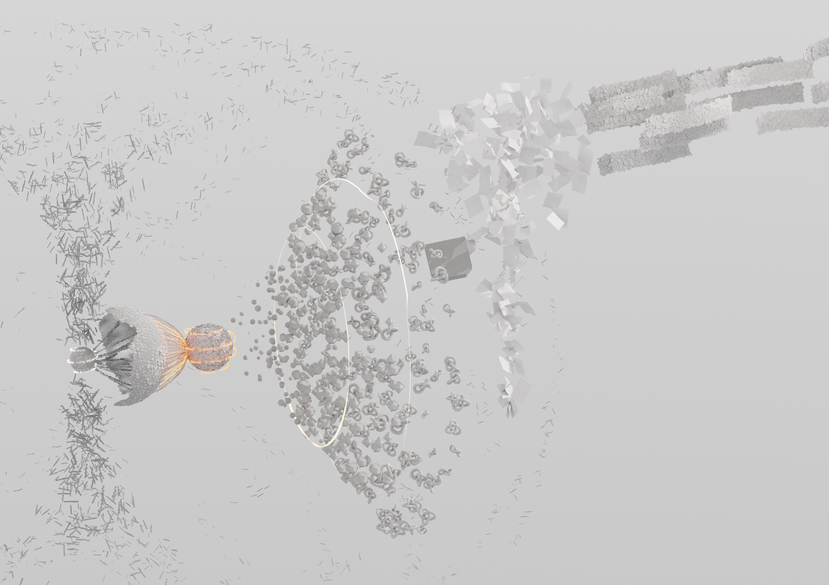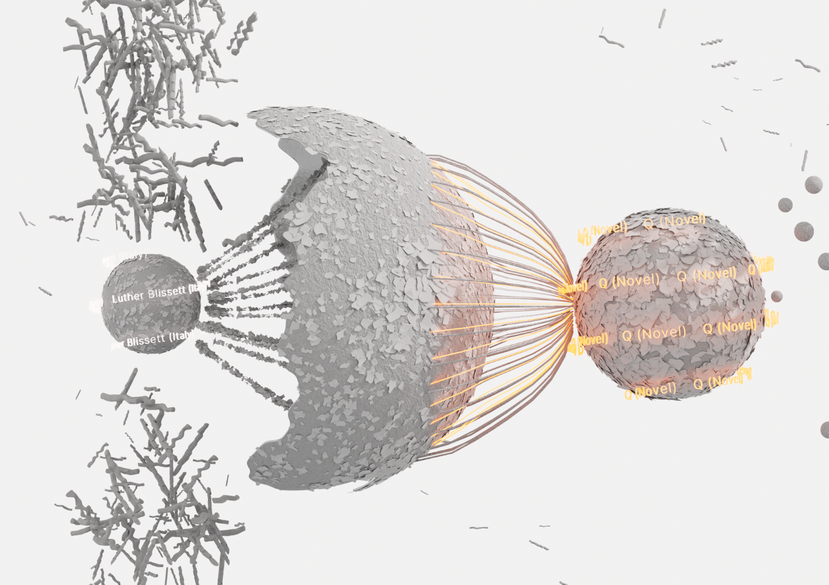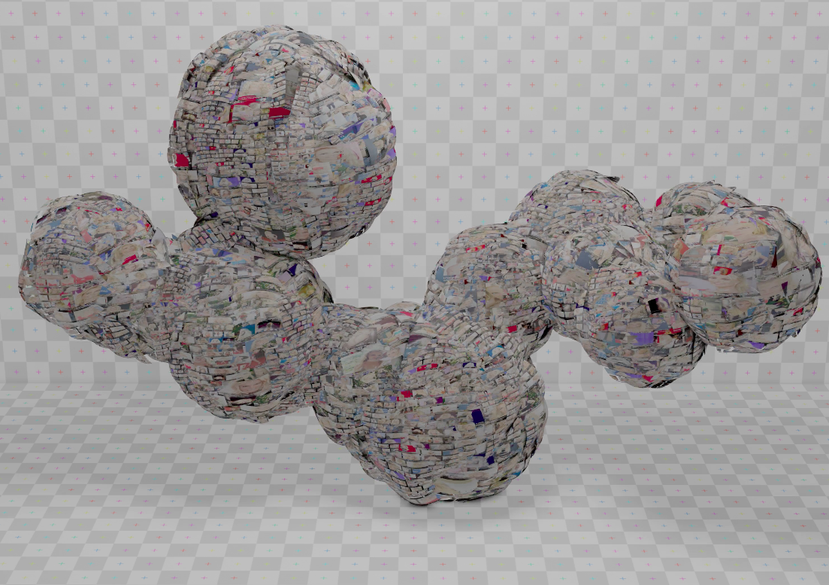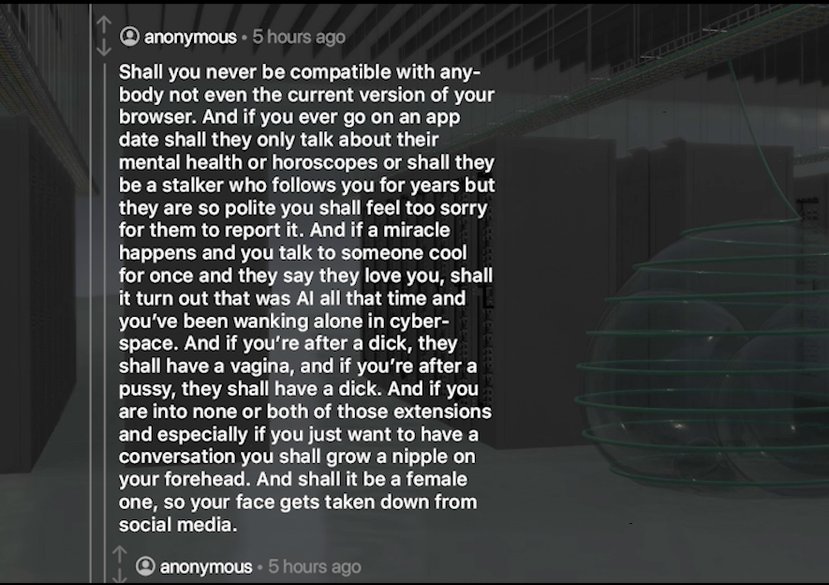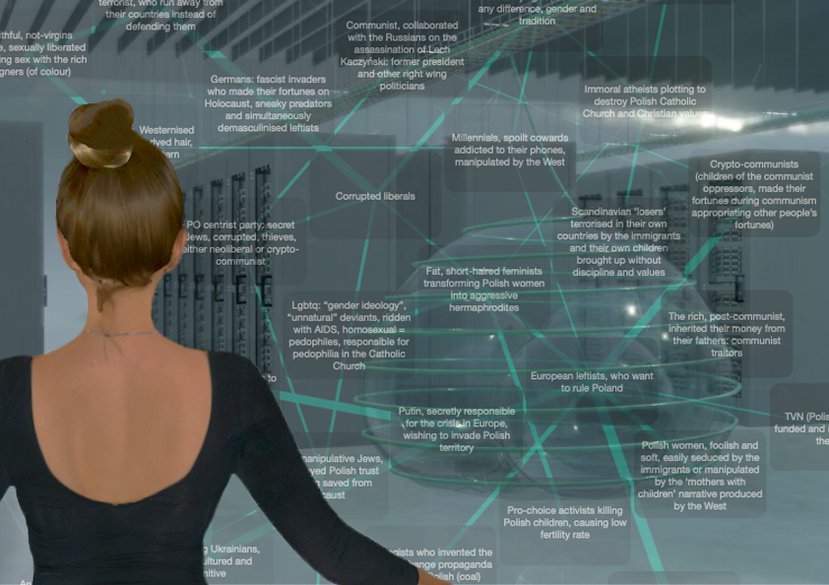
Cartographies of fascist storytelling - a bestiary of 21st century coding
Responses to the development of machine learning and the expanding/ densifying network of the Internet of Things tend to oscillate between belief in perpetual technological optimisation and fear of the omnipresent but yet not fully graspable algorithmisation of life. The first sees in the no-longer-just-human the opportunity to transgress its broadly understood limitations through the unbiased and error-free algorithmic decision-makers. The latter, equating the unhuman with the inhumane, claims that algorithm-based technologies threaten political freedom and social agency, through (re)production of probable futures based on derivatives of historical data (Nestler). In this context, the Algorithm — a monstrous Other — is also perceived as a digital spy, seducing us into political radicalisation and compulsive virtual participation. In this understanding, the algorithmic is rendered guilty of catalysing the contemporary fascist moment (Bridle).
This thesis is preoccupied with grasping a change in the processes of circulation of wisdom in what seems to be the next technological revolution. It investigates processes of pathological meaning-formation with a particular emphasis on fascism and fascistic circulation. It attempts to understand similarities and differences between contemporary fascism and the totalitarian turn(s) at the beginning of the 20th century, massified by technologies of their time. This is performed through the analysis of contemporary economy of storytelling-imagining, and examination of the role of algorithmically massified, distributed and often generated sensuous ‘image-stories’ in the form of fake news, memes, personalised emojis and Deepfakes.
My line of thought attempts to break with immaterialisation of the digital, and stratification of the social (into politics, culture, language or private and public spheres). Instead, the algorithmically changed articulation of the political requires looking at the processes of meaning-making not as discursive or speculative but rather based on intensities, emerging though difference-repetition (Deleuze; Heidegger), belonging and entanglements of pattern. It requires rejection of linear temporality and an assumption that events unfold through/in time. Rather, it assumes material space-time, and curved temporalities. The consequence of that, is the analysis of contemporary fascist phenomena not through the prism of ideology, discourse or psychology (group’s or individual) but acknowledging libidinal circulation of meaning as matter (Golding; Nail; Lyotard).
This thesis is written in symbiosis with a dynamic 3D bestiary that attempts to map couplings, clashes and (re)orderings within narrative clusters of fake news, conspiracy theories and hate speech. Focusing on cartographies of the political, allows to question the no-longer-universal notions of space and time, and re-imagine the materiality, interactions and connections of the ‘story-image’ clusters. Monstrosity (from Latin, to show, to bring forth) is a methodological provocation allowing to re-think the radical other of the algorithmic, the virtual and the artificial.
Key details
School, Centre or Area
Area of expertise
Supervisors
Funding
-
2019-2023: LAHP The London Arts and Humanities Scholarship, academic scholarship
Gallery
More about Sonia
Biography
Sonia Bernac is a storyteller investigating the ontological politics of algorithms in the information age, their matter(ing) and encounters in the context of fascism. Her research, based on conversations with the members of alt-right focuses on abnormal forms and pleasures of fictioning in the post-truth realities. Bernac is a founder of the Idle Institute - a storytelling lab and a collective of writers, musicians and engineers, who examine the potentialities of storytelling in anti-fascist resistance. She has received the LAHP scholarship.
Degrees
2012 – 2015: BFA Fine Art (First Class Honours)
Ruskin School of Drawing and Fine Art
University of Oxford
2016 – 2018: MFA Contemporary Art Practice (Public Sphere Pathway)
Royal College of Art
London
Experience
2020: Crit leader, School of Arts and Humanities, Royal College of Art
2020: Visiting panelist, CAP Degree Show panel, Royal College of Art
2021: Visiting artist and tutor, Liverpool Hope University
2019: Crit leader, School of Arts and Humanities, Royal College of Art
2018: Visiting artist, XD pathway, Central Saint Martins, UAL
2018: Visiting artist and tutor, Kingston School of Art, Kingston University London, visiting artist and tutor
2016: Studio assistant of Corin Sworn
2016: Install assistant, Andy Holden’s show at the Glasgow International festival, Scotland
2014: Internship at MOCAK: Museum of Contemporary Art, Cracow, Poland (press: en, pl)
2014: Internship at M – Museum Leuven, Leuven, Belgium
2012: Sculpture assistant in Adam Dawczak-Dębicki’s workshop in Poland, holder of The Ministry of Culture scholarship
Awards
(Selected)
2019: LAHP The London Arts and Humanities Scholarship, academic scholarship
2017: Winner, Red Mansion Art Prize, residency in Beijing, China
2016 – 2018:Leverhulme Art Scholarship, academic scholarship
2013:John Farthing Prize for Human Anatomy, University of Oxford
2013 – 2015:New College (University of Oxford) academic scholarship
Funding
2019-2023: LAHP The London Arts and Humanities Scholarship, academic scholarship
Exhibitions
(Selected)
2019: The itches, APT Gallery, London (as Idle Institute)
2019: The itches: a gym for public embarrassments, Xero.Kline.Coma, London (as Idle Institute)
2018: Liverpool Independents Biennial 2018, Francis Ewes Gallery, Liverpool (as Idle Institute)
2018: RCA Graduate Exhibition 2018, Royal College of Art, London (as Idle Institute)
2018: Whose space is it anyway? FACT Gallery, Liverpool (as Idle Institute)
2018: Red Mansion Art Prize Exhibition, Hockney Gallery, London (as Idle Institute)
2017: On the Closing of a [Lanark] Leisure Centre, Glasgow (writer-contributor)
2017: Catch The Flag, Micro Hutong, Beijing, China (as Idle Institute)
2017: The Trials of Mosquitoes, Open Studios, Shangri-La, Fei Jia Cun, Beijing, China (as Idle Institute)
2017 RCA WIP show, London
2015 Ruskin Degree Show 2015, Oxford
2015 Local theories of aerodynamics, Dolphin gallery, Oxford
2015 Day Rattle, Boathouse, Oxford
2015 Six figures getting sick, New College, Oxford (exhibitor & curator)
2014 Daub: look what we made, Oxford (exhibitor & curator)
2013 The Material, Freud, Oxford
Publications
(Selected)
2021: Q, PROVA RCA Arts & Humanities Research Journal
2021: Cartographic bestiaries or a matter of algorithmic monsters, Penrose Helix, Queensrollahouse, London
2020: An algorithmic curse for humans and cyborgs, PROVA RCA Arts & Humanities Research Journal
2019: Enigma, Folium, Lily Brooke Gallery, London (as Idle Institute)
2019: Miracle Measure. The SSN conference’s answer to the imprecision of doits and tinkers, The Grand K, Science Museum, London (as Idle Institute)
2019: Cybernetic Fairytales, Xero, Kline & Coma (as Idle Institute)
2018: The trials of mosquitoes, The Pluralist, issue 3, 2018 (as Idle Institute)
2017: The burial of a potato, Tall Tales, research group lead by Jordan Baseman, publication accompanying exhibition
Conferences
2021: A matter of algorithmic monsters, Posthuman mimesis: embodiment, affect, contagion conference, KU Leuven
2021: The itches: embodiment in in the age of technological entanglement, Curative Things: Medicine / Fashion / Art conference, Leeds Arts University
